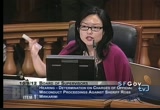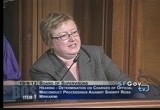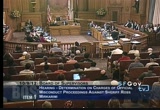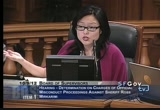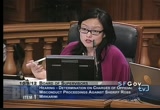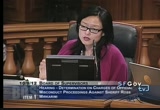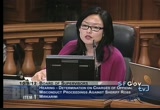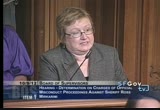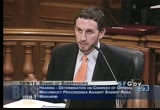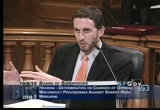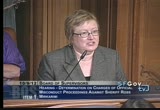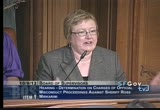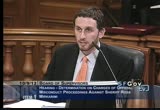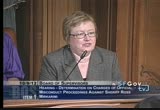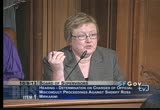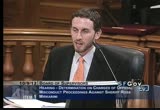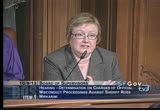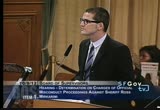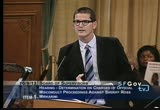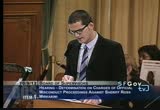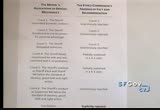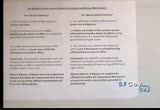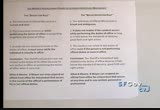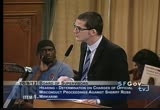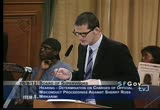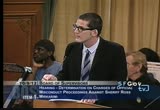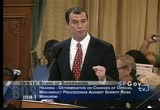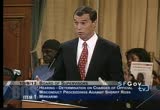tv [untitled] October 14, 2012 1:00am-1:30am PDT
1:00 am
when does it fall below the standard of decency? a dui could be -- as a misdemeanor. you didn't hurt anyone per se, but you could have. you could have killed someone on the road, right? so i guess that's where i would like more clarity. when does it fall below the standard of decency for the sheriff, if we were to argue that there are standards? >> well, the mayor submitted the testimony of an expert, this person was the chief -- is william -- the chief of police of the san diego police department. and he testified about the ethical standards and the professional conduct standards that are expected of a chief law enforcement officer. now, commissioner hur mentioned that the chief testified that any misdeed at all would be official misconduct, if committed by a sheriff.
1:01 am
i don't think that's entirely accurate. i think what the chief testified to is that -- is that the sheriff is expected, under the professional and ethical standards associated with his particular office, to avoid most forms of dishonesty, that behavior -- accountability, being a poor role model. there are many kinds of wrongful behavior that don't rise to the level of criminals that are wrongful for a sheriff. but at the end of the day, i don't think -- i think you're posing the more difficult question than the relationship test. your question is when is the -- when is the misconduct severe enough that we should consider it official misconduct. and that isn't a function of the relationship test. conduct may relate to the duties of office without being so severe that it should rise to
1:02 am
the level of official misconduct. i think that that -- the charter does not offer you an answer to that question. i think that it's a case-by-case determination, that it's committed to the sound judgment of the mayor and the ethics commission and this board. i think that there -- >> supervisor kim: can i clarify that because i really want to understand the test as you understand it. >> okay. >> supervisor kim: so if it is the second prong of your test, the relationship test, that you said merely the relationship test is not enough because any misdemeanor relates to the duties of the sheriff's office. so it would be a relationship test, plus what the mayor and the ethics commission, and what we deem as falling below the standard of decency, and that is a case-by-case basis. >> yes, that's correct. and you would be guided by the standard of professional conduct that is specific to the office
1:03 am
that the elected official holds. so it would be different for example for the tax collector and the sheriff. >> supervisor kim: let's keep the the tax collector out. if we are going to say that there're standards, which i'm not sure i agree with but if we agree it's standards relating to your specific office, specifically the sheriff's office, how do i delineate when it falls below the standards of decency? so what can guide us in the future when it's not a domestic violence? what can guide us in understanding when it falls below the standard of decency? that's what i'm trying to grapple with. >> i see. i think it is a discretionary decision. i think you can look to the case law, you can look to the norms of the city, the morass of the city. i think that it is, at bottom, a judgment call. there have been times, 50 years ago, when a sheriff committing a
1:04 am
little arm grab truly would have been no big deal, right? the severity, the understood severity of that conduct has changed over time. and it may change again. i don't know. but there is no hard and fast, where you can look it up -- >> supervisor kim: and i appreciate your answer, but does that open us up to the vagueness issue, which may make that clause then unconstitutional because then a person may not reasonably be able to predict when their behavior is official misconduct or not? >> no. the courts -- when the courts have looked at the vagueness issue, they have not focused on the separate question that you're posing right now which is how do you know when the misconduct is severe enough to warrant the sanction. >> supervisor kim: i'm not saying that it's severe enough. you're saying we're supposed to use our judgment in determining
1:05 am
when -- if it meets the relationship test, whether it falls below the standard of decency. so if that is the test, does it fall below my standard of decency, and that may change over time depending on who's on the ethics commission, who's on the board, who's the mayor, doesn't that open up the question to whether this is vague and therefore doesn't lend to a predictability for when an individual is supposed to determine whether this is official or not official misconduct? so not how severe the misconduct is but you're stating we're supposed to use our standards of decency, you're suggesting. >> i see where i've miscommunicated with you. this is why the standards of decency or the standard of conduct is position-specific. because it's not up to you, and your personal view of what the standard of conduct should be for the sheriff. it's actually a standard of conduct that is known to members of the profession of how a law
1:06 am
enforcement officer and a chief law enforcement officer is expected to conduct himself or herself in the course of discharging his or her duties. that is a standard that's capable of discernment with the help of other people in the profession. >> supervisor kim: is the position of marijuana considered as falling below that standard. >> for whom? >> supervisor kim: you said that there was actually a point that it wasn't a moving target, right? that actually this could be discerned as falling below -- i don't want to put words in your mouth.
1:09 am
this is a test for the placement. this is a test for the placeme placement. >> peace officer in general, and then what does the sheriff specifically oversee and not oversee. which is a better way of looking at it, or can we look at it either way? >> i think that both of those ones is - is -- offers some cla. if you want me to pick my
1:10 am
favorite, that i think is more analytically better, the one that looks at offenses in relationship to the duties of a chief law enforcement officer more than which offenses will land you in county jail. the reason for that is something sometimes the more serious county jail, they'll land you in state prison or federalúgq÷ pri. and so i mean there are ways in which our local criminal justicy system is -- isn't set up to deal and to focus on the most serious5,px crimes. but we don't want to let those serious crimes go, and say they don't relate to the duties of office, just because they're more serious than our local criminal justice system tends to focus onoq%vdú> is it more appropriate to look at it from the perspective that the sheriff oversees
1:11 am
violence programs and offenders or that a deputy sheriff or police officer who committed domestic violence in the same circumstances would be treated in x way. i think those are both appropriate considerations. as i said i think both lenses offer helpful information. and i don't think it's a choice really between either or. you have to consider the nature of the misconduct and how it relates to the duties of)rc$xff. and in this particular case frankly the sheriff isn't just like any line deputy, right? the sheriff should be held to a profession would be held to a higher standard than a line deputy. so a line deputy, who might merely be suspended for a particular offense, if someone higher up in the organizatio]m%ñ commits that same offense it's a more serious breach and they experience morecn serious
1:12 am
discipline. >> now, speaking of that, i know the sheriff's attorneystçkc hai think taken a different perspective on that, and this is my interpretation ofnj6s( their argument which i'm sure they'll correct if i've misinterpreted@ it. even though the sheriff, you would think, someone in a/iy-z r up position would be -- than other folks on the line but i think the sheriff@t5ñ is an eled position that's something that's different, the(á&yt person thats been elected, the person can be recalled, the person can be -- so therefore, you don't just say because[hm,)pdu domestic violet in determination of a line deputy, in a you apply thaty#ñbo the sheriff. i'm not -- of you the validity or lack thereof but i'm just curious -- i know you touched on this somewhat in the briefing but if you could respond to that. >> sure. i think one thing that's important to be aware of is that
1:13 am
1:14 am
-- >> and it is an option and an alternative that the voters themselves placed at the city's disposal. so it's not as though elected officials can only be recalled, and that's what the people of san francisco contemplated. quite to the contrary. the people of san francisco put this tool in your hands to serve their purposes so that you will serve their will and not tolerate elected officials who tolerate elected officials who commitkw;yíj that this issue came up during
1:15 am
the 1996 -- whatever that year was when the revised charterbc6s adopted. i can't imagine that this particular provision was a major aspect of that campaign. i don't know whether it was inwç the voter handbook, if there are arguments. i tend to doubt that was much of thean6ákñ focus. but is there a way to go about determining whether the voters, or the board, when it placed them on the ballot, believed that elected officials should be treated differently than appointed officials? in terms of determining official misconduct, given that elected officials have to stand for election and can be/>gq recalle? >> you know, there is no legislative history, there's no ballot history,v2l÷ that shedst on that question, or frankly any other question in regard+b%q÷ ts provision. what we have, and what we're
1:16 am
case laws that existed at the time, the maz olm0ji>hp)j decis, his which was the only case that ever dealt with official explanation of what this was intended to mean. and that means, for us, that wew need to focus, and the mayor has focus, really, on the language of the charter itself as the best2 and there is no distinction whatsoever between the appointed and the elected official"jñ that this section covers in the charter. and that suggests that the them differently. >> thank you. >> president chiu: thank you.lq4 colleagues, any additional questions? at this time, why don't we now .
1:17 am
>> good afternoon, mr. president, members of the board of supervisors. my name is davidfbtl] waggoner,i along with co-counsel shepherd kopp aregd6t representing sherif ross mirkarimi this afternoon. also with us is paula kiny representing elanea lopez. thank you for this opportunity to tell you exactly why the mayor's discretionary decision to suspend the sheriff was without basis in the law and why you must ultimately reinstate the sheriff. ross mirkarimi campaigned on the power of redemption. he's been a key proponent of
1:18 am
restorative justice in this city. but there is no question that on december 31st, 2011, ross mirkarimi made a serious and terrible mistake. and how did he deal with that mistake? he immediately apologized to his wife. he entered into counseling. he apologized to the people of san francisco. he pled guilty to a criminal offense. all of that underscores the responsibility that rossq]j terrible mistake that he made on new year's eve last year. and as a result of that mistake, several months from his wife and son. he was suspended without pay, with no means to provide for hi family. his entire life's work was destroyed almost in an instant. he's beenwácf described by the r and the mayor's attorneys with the most inflammatory and
1:19 am
prejudicial rhetoric, yet at the end of the day, the punishment does not fit theyxúw crime. this afternoon, i'm going to spend a fe7%g minutes telling u about why this case is different than every other case. i'm going to compare the?÷ mayos position to the position of the ethics commission, and then i'm going to turn it over to shepherd koppéqi who will tell u exactly why the conduct at issue here can never >hl#y official misconduct. first as to the historic nature of thisñ(xñ proceeding. for the projector. >> this is the first time that commission has ever made a recommendation to the board of supervisors regarding charter section it's the third time in the history of this city the board has ever been asked to decide o a mayor's suspension of an elected official.
1:20 am
official misconduct. egan and -- two ross mirkarimi did not commit a time. like all of the cases ross misconduct while in office. theh committed official misconduct in what makes this unique is the mayoru;p has decided to suspend on nothing more than a office. not -- it's not simply a question of whether to uphold or even a decision of the mayor. ultimately you must decide the will of the voters.
1:21 am
because you are confronted with the possibility of removing an official the highest levels of due process should apply. the mayor has argued the lowest level should apply. he's argued for the broadest definition, the lowest standard of proof. he's submitted evidence that the in the words was designed to poison -- but even with the preponderance of echedz, with the majority vote of eeghts, was the mayor successful saying ross committed misconduct. the answer was no. after countless hours of testimony ethics commission made seven findings of facts. of those seven findings, only four can be considered misconduct -- excuse me only three can be considered
1:22 am
misconduct. allegations were rejected by thw the gun charges, the dissituation allegations, the abuse of officeú@s"t allegation, that's counts 1, count 2, count unanimously rejected by the agents commission. close attention to count one course a part of this case. it's been made a key aspect of this case and the ethics commission unanimously rejected the domestic violence count in the case. what are we left with? what we've known all along. the sheriff wrongfully grabbed his wife and pled guilty to a misdemeanor the ethics commission did not sustain counts four and five but only official misconduct as reflected
1:23 am
in counts four and five which is not the same as sustaining them. where does that leave us? on the one hand, there's a bright line rule articulated by chairperson hur. on the other hand there is a broad and ambiguous definition of official misconduct as articulated by attorneys for the mayor. where the bright line rule is narrow and clear, the broad rule is broad and ambiguous. where the bright line rule requires that the misconduct occur while performing duties of office or in relation or purporting to perform duties of office for the mayor it doesn't matter, if the conduct occurs while performing the duties of office or not. you can be on the job, off the job. it doesn't matter. it only matters if it falls below standard of decency which is a disetio discretionary decie
1:24 am
mayor. bright line rule must occur while the individual is in office and that's what mazzola found as well. the ambiguous rule it doesn't matter if the person is in office or not. they can commit official misconduct whether in or out of office. what does this ultimately mean? for the bright line rule, for chairperson hur's rule, a mayor can only suspend an official from office for conduct that occurs during the performance of the official duties. for the mayor, the ambiguous rule of the mayor means a mayor can suspend an official for misconduct that occurs at any time, and in any context, personal or professional. now, the mayor asserts a new theory to you, today, that's an entire course of conduct theory. it's not just that you must sustain one charge here, or
1:25 am
another charge here, two, or three. it's the entire course of conduct. but your task is much simpler than that. your task is whether or not to sustain the charges as drafted by the mayor. the ethics commission rejected the charges as drafted by the mayor. one voice the mayor does not want you to consider is that of eliana lopez. he never bothered to talk toám r and prefer that you ignore her too. the allegation that she recanted is flatly contradicted by$-k her own statements. mayor lee never bothered to speak with her. in the second instance, ms. lopez has never denied that sheriff mirkarimi grabbed her arm. the advocates have been months they too have never listened to ms. lopez. defending her have been attacking her.
1:26 am
victim. she's not an immigrant who violence. wants nothing more than justice. she wants justice for her family and she wants justice for the people ofiélx san francisco. after five months of hearings, you're left with a recommendation that, on its face, acknowledges it is al big with us. the agents commission, the majority says there's room for disagreement. but most importantly, the commission did not recommend that ross mirkarimi be removed from office. they explicitly discussed making such a recommendation to you and they rejected it. ultimately you have to decide if the mayor and the four commissioners are correct, should san francisco adopt a broad and ambiguous definition of official misconduct that could encompass any bear the mayor deems to be indesent, or is it only a bright line of official misconduct can insure
1:27 am
into process, avoid confusion, and avoid the possibility that some future mayor will be -- not by the rule of law but the temptation to remove a political adversary. removing an elected while not in office iscq.c4 not justice. if any case cry out for a bright line rule, for a clear and unambiguous application for the law to the fact it is this case. i will turn it over to shepherd kopp. thank you. >> president chiu: will remind members of the public, the first rule of this chamber is for members of the public not to express either applause or other statements. thank you. mr. kopp. >> thank you. good afternoon, members of the board, president.
1:28 am
i'm shepherd kopp and along with mr. wagner i've been representing sheriff ross mirkarimi during these proargs. i want to discuss why we strongly believe that we don't need to draw from other jurisdictions as the mayor has, in order to arrive at a definition of official misconduct, that works in san francisco, and that is workable. and that has been tested. and the reason that we have come back time and again to the case involving commissioner mazzola is because, in that case, we saw board of supervisors sitting in judgment here, that undoubtedly thought they had made the correct decision, only to discover years later, after mr. mazzola was out of office, that they had decided incorrectly. now the reason that the court of appeal in mazzola was able to determine that official misconduct was not some vague, unconstitutional abstract notion
1:29 am
is because there was a body of law that had been developed over the#r#pñ years. and every case that discussed official misconduct, the of their duties. and that's why the court of appeals will'a"dc say this is nt unconstitutionally vague, all at this definition. in fact, the amendment to the almost exclusively drewa5ñúz from the language that is included in the mazzola case. there was maybe one or two words thatzk9u" added. to this day. what does mazzola say.ns5 it says misconduct has to occur while the public official is in office. because a public official doesn't have any duties unless they are holding that office.
1:30 am
106 Views
IN COLLECTIONS
SFGTV: San Francisco Government Television Television Archive
Television Archive  Television Archive News Search Service
Television Archive News Search Service 
Uploaded by TV Archive on

 Live Music Archive
Live Music Archive Librivox Free Audio
Librivox Free Audio Metropolitan Museum
Metropolitan Museum Cleveland Museum of Art
Cleveland Museum of Art Internet Arcade
Internet Arcade Console Living Room
Console Living Room Books to Borrow
Books to Borrow Open Library
Open Library TV News
TV News Understanding 9/11
Understanding 9/11